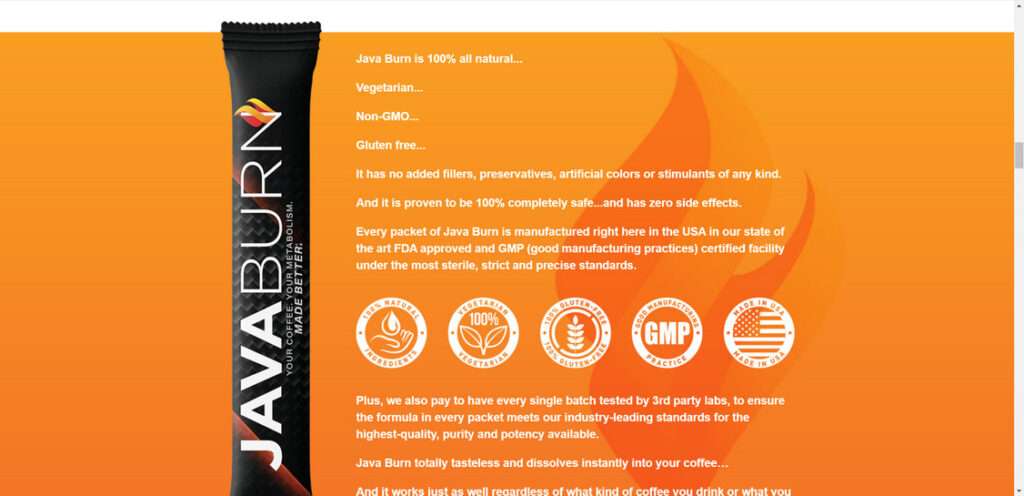Forget the latest “coffee trick” ads promising dramatic weight loss. Java Burn, the trendy new supplement marketed as a metabolism-boosting coffee mix, is just another gimmick preying on people’s hopes and wallets.
This article exposes the deceptive strategies used to promote Java Burn and why it exhibits all the hallmarks of a scam. We’ll analyze the sneaky sales tactics, false claims not backed by science, shady company origins, and real customer experiences proving it doesn’t work.
Read on to learn how to protect yourself from this coffee-themed weight loss scam and others using similar tricks and emotional appeals to exploit consumers.

Overview of the Java Burn Coffee Loophole Scam
Java Burn is a weight loss supplement being deceptively marketed online as a “coffee trick” or “coffee hack” to help you lose weight. However, Java Burn is just an overpriced powder making false claims not backed by science.
The advertisements feature dubious celebrity endorsements, fake doctor recommendations, and misleading claims that Java Burn is “clinically proven” to cause significant weight loss. No credible studies validating these claims seem to exist.

Java Burn appears to be using shady marketing tactics to take advantage of people’s hopes for an effortless solution to lose weight. Let’s analyze the deceptive strategies used to promote this likely scam product.
How the Misleading Java Burn Scam Works:
- Uses fake celebrity endorsements and doctor recommendations
- Makes exaggerated claims of being “scientifically proven”
- No evidence for weight loss abilities
- Auto-shipment scams bill you repeatedly
- Refunds are difficult or impossible to obtain
- Shady company behind product is untraceable
- Customer reviews report no weight loss results
Exposing the Deceptive Tactics Behind the Java Burn Coffee Loophole Scam
The marketers of Java Burn utilize unethical marketing strategies including:
1. Fake Celebrity and Doctor Endorsements
The ads feature fake recommendations from celebrities like Kelly Clarkson. These are complete fabrications.
2. Exaggerated Claims of Being “Scientifically Proven”
Java Burn is touted as clinically proven to cause substantial weight loss. But no studies validating this exist.

3. False Claims of Elite University Studies
The ads claim Java Burn is backed by studies from Harvard and Yale. This appears to be an outright lie.
4. Mind-Numbing Pseudoscience Explanations
Convoluted pseudoscience jargon is used to confuse prospective customers.
5. Auto-Shipment Scams
Hidden terms enroll you into monthly shipments of Java Burn without consent. This recurring billing scam is difficult to cancel.
6. Difficult Refund Process
Many report being unable to obtain refunds after Java Burn fails to cause weight loss. The refund policy makes it nearly impossible.
7. Shady Company Origins
There are no verifiable details on what company sells Java Burn or where it is produced. Lack of transparency is a major red flag.
8. No Real Customer Reviews
No credible Java Burn reviews from real paying customers could be found online. Only fake reviews are shown on their site.
In summary, Java Burn exhibits numerous signs of being a scam supplement, including false claims, fake celebrity/doctor endorsements, exaggerated pricing discounts, auto-billing scams, and no transparency about the shady company behind it.
This scam has been also investigated by Jordan Liles on his YouTube channel, where he offers a detailed video on the subject. We recommend watching his content for a comprehensive understanding of the scam.
Next, let’s break down exactly how scammers carry out this scam from start to finish.
Explanation of the Java Burn Scam Process
Here is a closer look at how the deceptive Java Burn scam unfolds:
1. Emotional Video Sales Pitch
Misleading videos on social media platforms give an emotional sales pitch making wild claims about Java Burn.
2. Fake Celebrity and Doctor Recommendations
Well-known celebrities and doctor’s names are deceptively used to build credibility.
3. Convincing Claims of Being “Scientifically Proven”
The ads claim studies from Ivy League universities prove Java Burn causes substantial weight loss.
4. Mind-Numbing Pseudoscience Terms
The pitch uses science-sounding terms that confuse viewers into thinking Java Burn is backed by complex research.
5. Fake Limited Time Offers
Countdowns and limitations pressure people to buy Java Burn immediately before the discounted pricing expires.
6. Hidden Auto-Shipment Terms
In some cases the fine print mentions recurring monthly shipments of Java Burn people didn’t consent to.
7. No Transparency About Company
There are no verifiable details about the company selling Java Burn or where it is produced.
8. Refund Difficulties
Many report being unable to obtain refunds after Java Burn fails to cause weight loss as advertised.
In summary, Java Burn functions like a stereotypical scam product – making wild claims backed by fake studies, using deceptive pricing tricks and auto-ship scams, providing no transparency about the shady company behind it, and refusing to issue refunds when the product inevitably fails to work as advertised.
Java Burn Receives Overwhelmingly Negative Reviews on TrustPilot
An objective source for uncovering the truth about a suspicious product is analyzing reviews on TrustPilot. This independent review platform publishes uncensored comments from real paying customers.
The TrustPilot page for Java Burn paints a very concerning picture. Out of over 36 reviews, it scores an abysmal 1.4 out of 5 stars. The most common sentiment is customers reporting Java Burn did absolutely nothing for their weight after months of use.
Many people express regret and feeling scammed after wasting money on a product failing to deliver results. Others had difficulty getting refunds honored despite the money back guarantee touted in the ads.
Below are some examples of Java Burn experiences users reported on TrustPilot:
Vera Uyleman wrote: “Why would you order when they only give you 60 days but tell you it will be more affective when you use the product for 90 days! Never order when they only give you 60 days to try!!”
Anna Halama said: “I wasted about £100 I couldn’t really afford because I was taken in by the marketing. It was hard to find any independent reviews out there.”
Lorrainne Turrell stated simply: “It’s crap.”
Steve B reported: “JAVA BURN A WASTE OF MONEY. Same as others. Tried for 3 months consistently and zero results. In fact I actually gained weight. Waste of money.”
The overwhelmingly negative Java Burn reviews on TrustPilot stand in stark contrast to the glowing testimonials shown on the product’s own website. This lack of real evidence of weight loss experienced by actual customers is concerning.
Prospective buyers should carefully examine unbiased sources like TrustPilot to make informed decisions about any product making bold claims not supported by independent peer-reviewed scientific research. Relying solely on a company’s own marketing materials can be misleading.
What to Do If You Fell Victim to the Java Burn Coffe Loophole Scam
If you bought Java Burn but did not experience the promised weight loss results, here are some tips:
1. Request a Refund Immediately
Contact the company right away to request a refund. Do this within 30 days while the return window is still active.
2. Dispute the Credit Card Charges
If your refund is denied, file a dispute with your credit card company stating that the product did not work as described.
3. Cancel Any Recurring Payments
If you were signed up for monthly Java Burn orders without consent, instruct your card issuer to block any further charges.
4. File a Complaint With the BBB and FTC
Submit complaints about Java Burn’s deceptive business practices and false advertising claims.
5. Leave Online Reviews Warning Others
Post honest reviews about your experience with Java Burn to warn others it is a scam. Stick to factual details.
6. Consult a Consumer Protection Attorney
An attorney can advise you if any legal action can be taken to recover lost money from shady scams like Java Burn.
7. Avoid Similar “Coffee Hack” Weight Loss Scams
Be wary of any products promoted using similar dubious marketing tactics and outrageous claims around causing weight loss by adding something to your coffee.
8. Consult Real Medical Professionals
See qualified doctors, nutritionists, and dietitians for science-backed guidance on safe weight management strategies customized for you.
Apply critical thinking when evaluating claims made in online advertisements. Do not fall for emotional appeals, celebrity endorsements, or claims of university-backed “secret cures”. Protect yourself and others from scams by reporting them.
The Bottom Line on the Java Burn Scam
In summary, Java Burn appears to be a weight loss scam making misleading claims of being scientifically proven to help you lose significant weight. In reality, no studies validate these claims.
The shady company behind Java Burn uses many deceptive marketing tactics – fake celebrity/doctor recommendations, convoluted science-sounding jargon, auto-ship scams, refusing refunds, exaggerated pricing discounts, and no transparency about their origins.
No real customer reviews showing Java Burn achieved drastic weight loss results could be found. The product has multiple red flags indicating it is a scam.
The ads leveraging fake celebrity endorsements to promote Java Burn as a “coffee trick” for effortless weight loss are deceptive. There is no magic “coffee hack” for weight management – only legitimate medical strategies involving lifestyle changes and proven treatments.
Avoid Java Burn and other products making similar outrageous, unsubstantiated claims. Do not waste money on what appears to be a scam. See qualified medical professionals for real science-backed guidance on losing weight safely.
This article is for educational purposes only and does not constitute professional, financial or legal advice. The content is intended for general information and should not be construed as definitive guidance. Information contained herein is subject to change without notice. For concerns, please contact us via the provided form.
If you are the owner of the website or product in question and wish to offer clarifications regarding your business or website, please reach out to us through the provided Contact Form.



